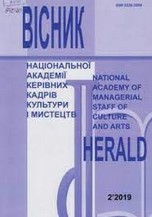КУЛЬТУРОЛОГІЧНІ ВИМІРИ РЕЖИСЕРСЬКОЇ ПРАКТИКИ XX СТ. В УКРАЇНІ (НА ПРИКЛАДІ МЕТОДОЛОГІЇ ВОЛОДИМИРА СКЛЯРЕНКА)
CULTURAL DIMENSIONS OF DIRECTING PRACTICE OF THE XX CENTURY IN UKRAINE (ON THE EXAMPLE OF THE METHODOLOGY OF VLADIMIR SKLYARENKO)
Author(s): Iryna Vilyamivna DatsSubject(s): Theatre, Dance, Performing Arts, Cultural history
Published by: Національна академія керівних кадрів культури і мистецтв
Keywords: XX century theater; Ukrainian theater; V. Sklyarenko; Ukrainian directing;
Summary/Abstract: The article aims to identify aspects relevant to modern directing practice, which were developed and improved during the professional activity of V. Sklyarenko. The research methodology consists of the application of the following approaches: culturological, historical-comparative, biographical, interdisciplinary, historical and theoretical generalization. Scientific novelty. For the first time article examines the work of the outstanding Ukrainian director V. Sklyarenko from the perspective of Ukrainian theater development of the XX century and in the context of today’s opera house challenges. Conclusions. V. the contextual dimension implicitly corrected Sklyarenko’s directing practice, and the master’s dominant genres reflected the cultural and artistic priorities of his time. The formation of the director’s creative method on the opera stage coincides with the significant rise of artistic life in the 60s when radical staging innovations were perceived as defining criteria, and the leading concept of each work held a sense of freedom. Sklyarenko’s long-term theatrical practice is a thorough comprehension and consistent extrapolation into each of Les Kurbas’s directorial concepts of high professional culture and aesthetics of the theater, directed by artistic openness to experimental innovations. V. Sklyarenko’s artistic concepts remain relevant in the theatrical practice of today, gaining new life in modern opera productions. The study of the director’s experience is necessary first because the Ukrainian opera theatre faces the fundamental of the revival of the national repertoire at the theatrical stage.
Journal: Вісник Національної академії керівних кадрів культури і мистецтв
- Issue Year: 2022
- Issue No: 2
- Page Range: 69-73
- Page Count: 5
- Language: Ukrainian

